Listen to the podcast :
The construction industry is undergoing a massive transformation, driven by construction software development backed by AI and the integration of technology in construction. The Business Research Companies quotes that only the residential building construction sector has experienced significant expansion, with projections showing an increase from $4,415.32 billion in 2024 to $4,666.39 billion in 2025, representing a 5.7% compound annual growth rate. This upward trend has been driven by multiple factors, including rising populations, favorable economic and mortgage conditions, supportive government initiatives, strong consumer sentiment, and evolving demographic patterns.
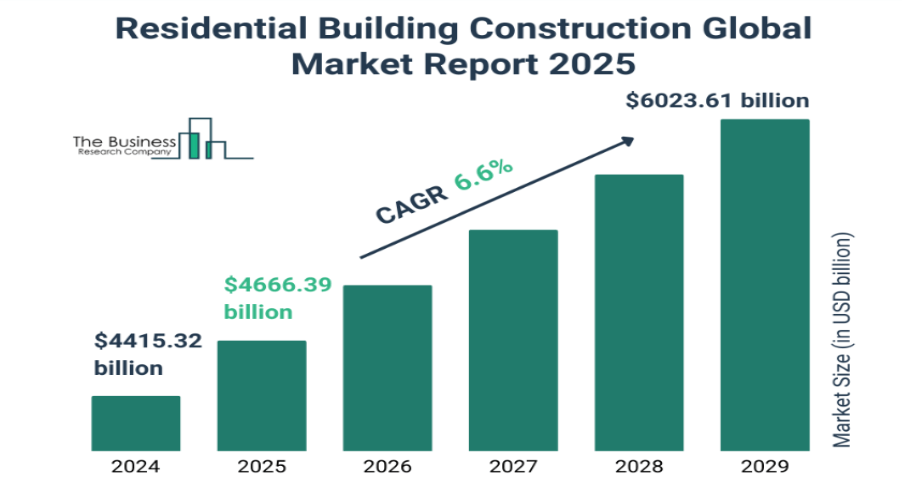
Thanks to the technology boost in the sector. From project management to real-time collaboration, Artificial Intelligence digital solutions are optimizing workflows, reducing costs, and improving efficiency. Companies that outsource these solutions to an offshore IT agency gain a competitive edge by accessing specialized expertise without the overhead of in-house teams.
This blog explores how construction software development is reshaping the sector, the role of technology in construction, and why businesses should consider outsourcing software solutions to a remote IT agency like WeblineIndia.
Looking to streamline your construction projects with smart software? Let’s talk.
The Rise of Construction Software Development
Construction software development has progressed rapidly, evolving from basic tools for task scheduling to comprehensive platforms powered by advanced technologies such as artificial intelligence (AI), the Internet of Things (IoT), and cloud computing. These innovations are transforming the construction landscape by improving efficiency, safety, and collaboration.
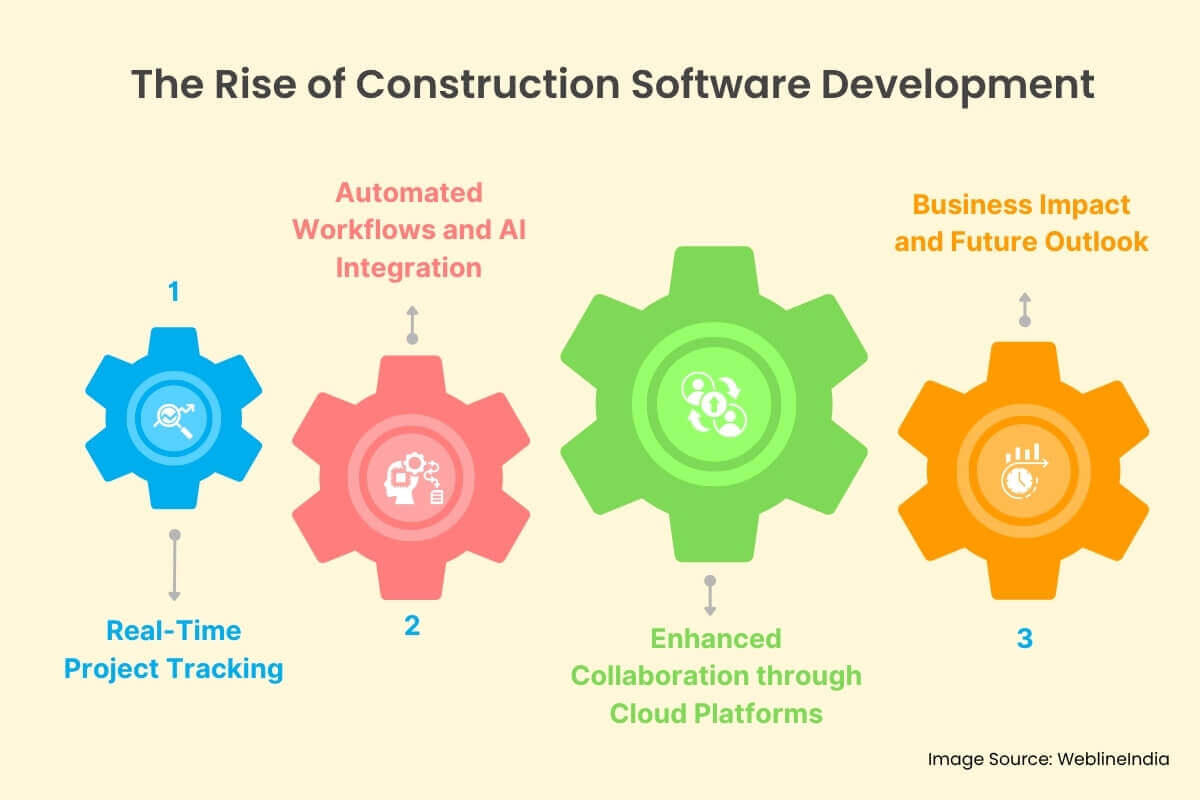
1. Real-Time Project Tracking
One of the most impactful developments is the integration of IoT devices and smart sensors on construction sites. These technologies enable real-time monitoring of equipment usage, project milestones, worker safety, and environmental conditions. Data from the field is transmitted instantly to centralized platforms, allowing project managers to track progress continuously, identify potential delays, and make timely, data-driven decisions.
2. Automated Workflows and AI Integration
AI-driven tools are revolutionizing how construction workflows are managed. Automated systems can handle complex tasks such as budgeting, resource allocation, and scheduling with minimal human input. These tools can also detect inefficiencies or errors early in the process, reducing rework and keeping projects on track. By automating routine administrative tasks, teams can focus more on value-driven activities and strategic planning.
3. Enhanced Collaboration through Cloud Platforms
Cloud computing has significantly improved communication and collaboration within construction teams. Cloud-based software provides a centralized platform for all stakeholders—including developers, architects, contractors, and clients—to access project data, share updates, and collaborate in real time. This seamless exchange of information reduces miscommunication, speeds up approvals, and ensures everyone stays aligned throughout the project lifecycle.
4. Business Impact and Future Outlook
By embracing these digital tools, construction firms are achieving greater operational efficiency, minimizing delays, and maximizing profitability. The shift toward integrated construction software not only improves day-to-day operations but also sets the stage for long-term growth and innovation. As technology continues to advance, its role in shaping the future of construction will only become more critical.
Need a reliable offshore tech team to build your construction software? We’ve got you covered.
Key Technologies Reshaping the Construction Sector
The construction industry is undergoing a digital revolution, with innovative technologies streamlining operations, enhancing safety, and improving overall project outcomes.
Here are some of the most impactful technologies transforming the sector today:
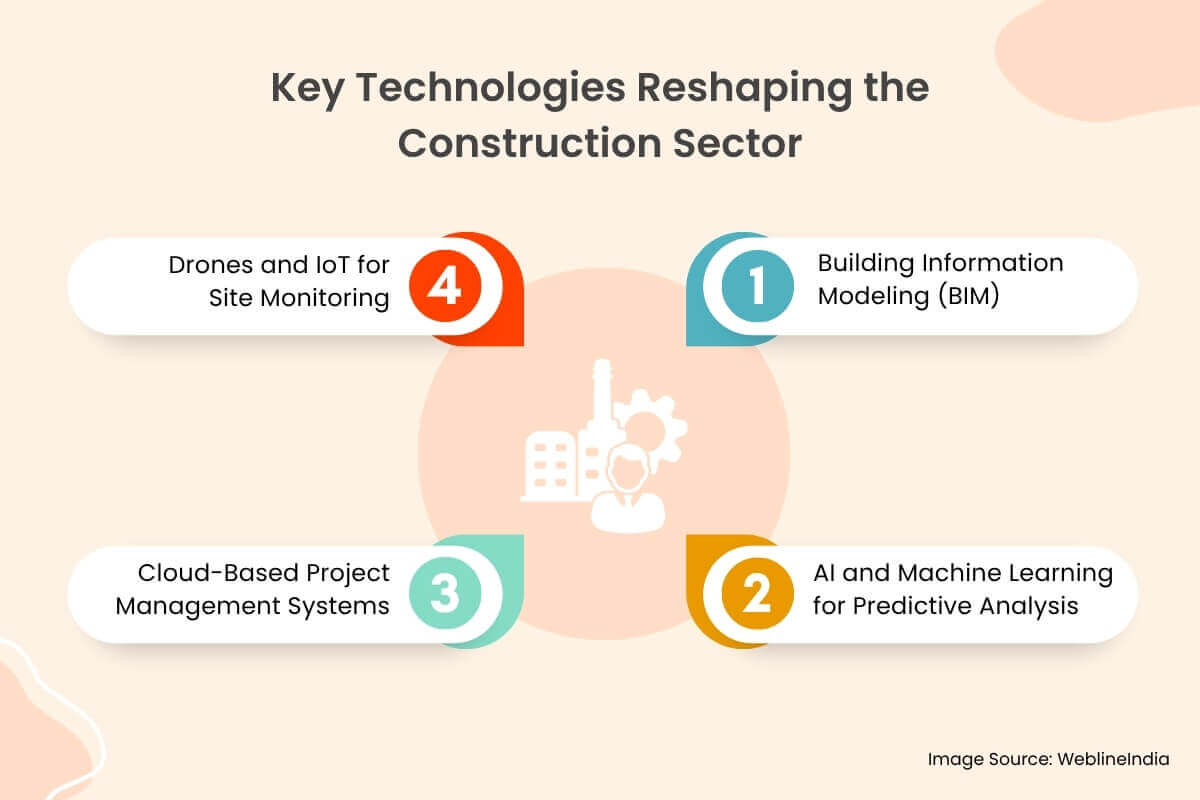
1. Building Information Modeling (BIM)
Building Information Modeling (BIM) represents a major leap forward from traditional 2D blueprints. BIM creates detailed 3D digital models of construction projects, allowing teams to visualize structures before a single brick is laid. This approach improves accuracy in planning and design, reduces costly rework, and optimizes resource allocation.
It also supports clash detection, helping identify potential design conflicts early in the process. BIM has become an essential tool, particularly for complex, large-scale developments, ensuring better collaboration among architects, engineers, and contractors.
2. AI and Machine Learning for Predictive Analysis
Artificial intelligence (AI) and machine learning are becoming indispensable in any business software solution, and construction software development is no exception. These tools analyze vast amounts of historical and real-time project data to forecast risks, predict schedule delays, and suggest optimal resource allocation. Contractors using AI-powered platforms have reported significant reductions in budget overruns and project delays. Predictive analytics also enhances decision-making by providing actionable insights into potential future outcomes, making project planning more proactive and data-driven.
3. Cloud-Based Project Management Systems
Cloud computing has transformed project management in construction. Cloud-based systems provide centralized access to project data, enabling real-time updates, document sharing, and communication across all stakeholders. Whether teams are working on-site or collaborating with remote IT agencies, cloud solutions ensure consistency and transparency. They also support version control, reduce data silos, and enable better coordination throughout the project lifecycle.
4. Drones and IoT for Site Monitoring
Drones and IoT devices are reshaping how construction sites are monitored. Drones provide high-resolution aerial imagery for surveying, progress tracking, and safety inspections. Meanwhile, IoT sensors are placed on equipment and throughout job sites to track usage, environmental conditions, and worker safety. These tools enhance site visibility, increase accountability, and allow for faster response to potential issues. Together, they foster a safer and more efficient work environment.
Why Outsource Construction Software Development?
Outsourcing construction software development has become an increasingly popular strategy among construction firms looking to stay competitive in a fast-evolving digital landscape. Partnering with an offshore IT agency offers several strategic advantages that go beyond mere cost savings.
Companies benefit from increased efficiency, access to expert talent, and the ability to adapt to dynamic project needs by outsourcing construction software development. It is all while maintaining high-quality standards.
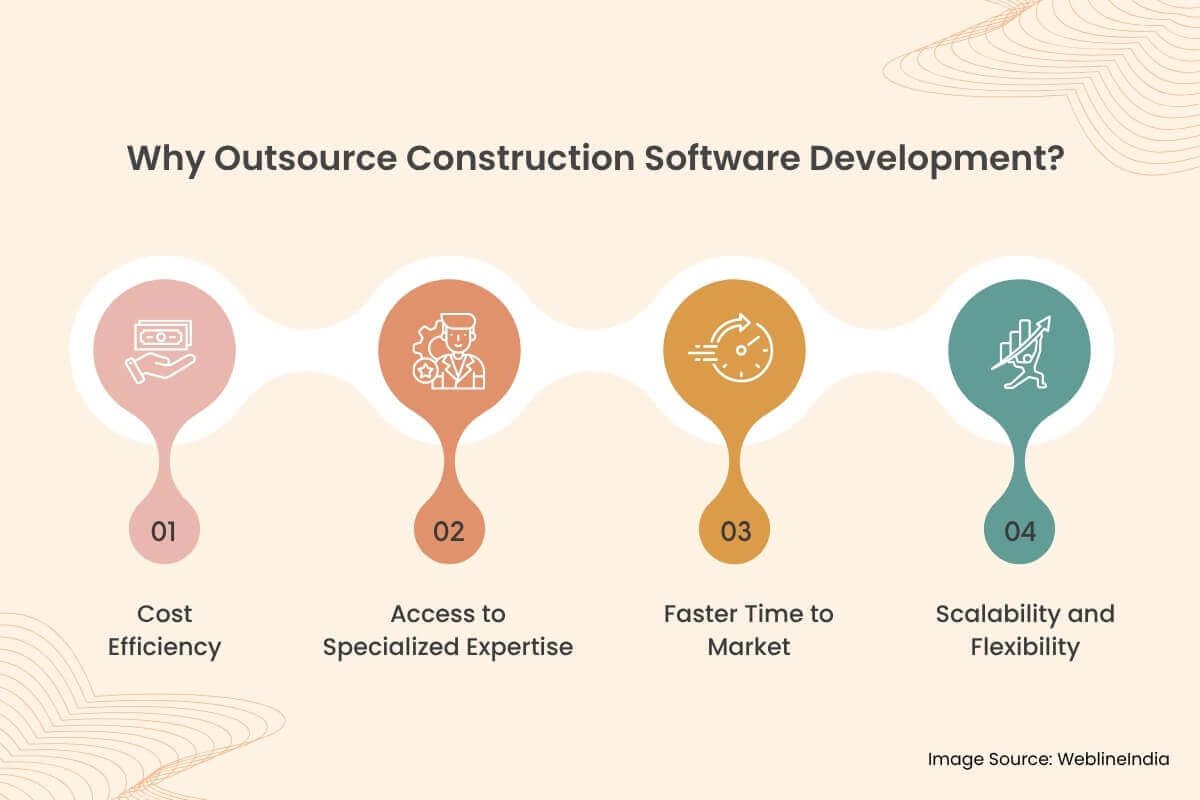
1. Cost Efficiency
One of the primary reasons companies choose to outsource is the significant reduction in development costs. Hiring and maintaining an in-house software development team can be expensive, especially when factoring in salaries, benefits, training, and infrastructure. Offshore development teams, particularly in regions with lower labor costs, offer high-quality services at a fraction of the expense. This allows companies to allocate their budget more effectively across other critical areas of a project.
2. Access to Specialized Expertise
Outsourcing gives construction firms access to a global talent pool with specialized expertise in construction-focused software solutions. Many outsourcing providers have experience developing tools tailored to the construction industry, such as project management platforms, BIM integrations, and IoT-based monitoring systems. This domain-specific knowledge ensures faster onboarding and a higher quality of output.
3. Faster Time to Market
Time is often of the essence in construction projects. Offshore development teams, with their experience and established workflows, can significantly accelerate the software development cycle. They often operate in different time zones, which allows for round-the-clock progress, reducing the overall time needed to bring solutions to market.
4. Scalability and Flexibility
Outsourcing also provides the flexibility to scale resources up or down based on the size and scope of a project. This agility is especially valuable in the construction industry, where project requirements can change rapidly. Firms can easily adjust their development capacity without long-term commitments.
Challenges in Adopting Construction Technology
Despite its benefits, integrating technology in construction comes with hurdles:
1. High Initial Investment
Advanced software and hardware require significant capital. However, outsourcing software solutions can mitigate costs.
2. Resistance to Change
Workers accustomed to traditional methods may resist digital adoption. Proper training and phased implementation help ease the transition.
3. Data Security Concerns
Cloud-based systems raise cybersecurity risks. Partnering with a reliable remote IT agency ensures robust encryption and compliance.
Future Trends in Construction Software Development
As the construction industry continues its digital transformation, new technologies are emerging that promise to further streamline processes, enhance safety, and boost productivity. Forward-thinking firms that embrace these innovations will gain a competitive edge and set new benchmarks for efficiency and performance.
Construction firms that anticipate and integrate these future-focused technologies will not only stay competitive but also redefine industry standards in the years ahead.
Here are the key trends shaping the future of construction software development:
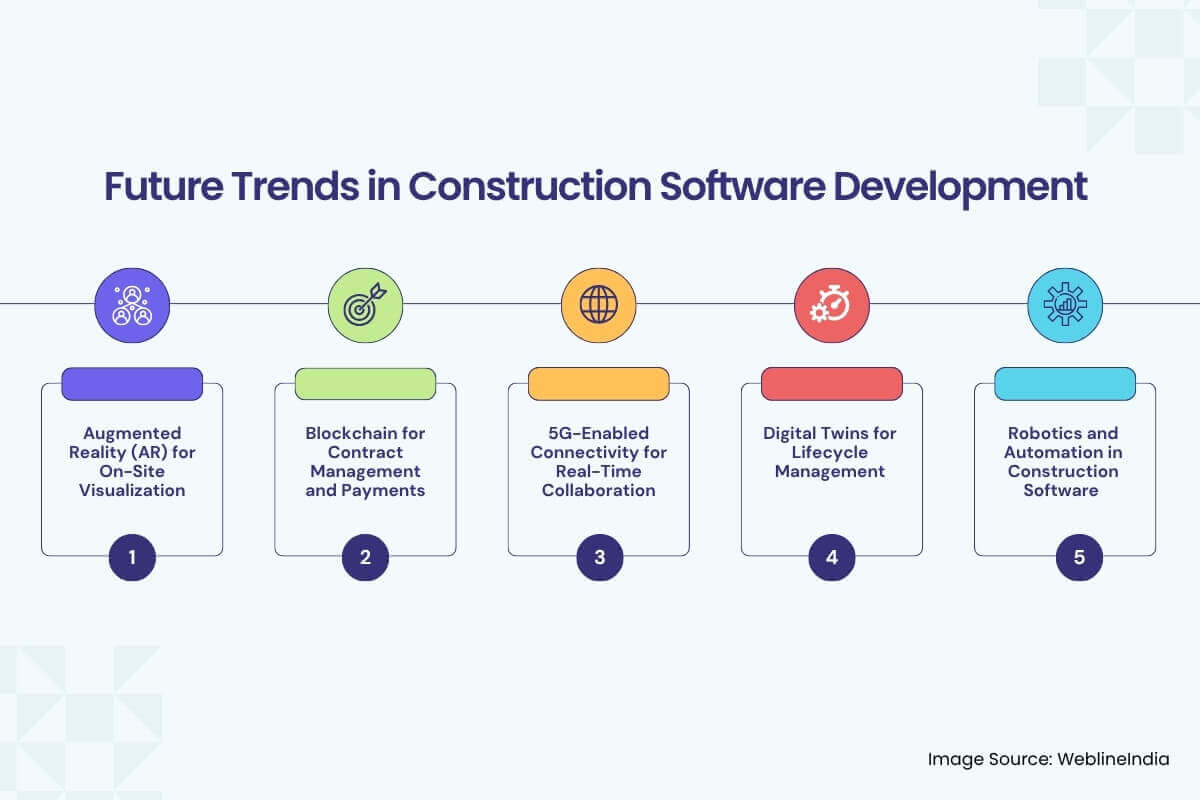
1. Augmented Reality (AR) for On-Site Visualization
AR is revolutionizing how construction teams interact with digital plans. By overlaying 3D models onto physical environments using AR-enabled devices, workers can visualize the final structure in real time. This improves precision during installation, enhances client presentations, and reduces errors caused by misinterpretation of blueprints. AR also supports interactive training and on-site inspections.
2. Blockchain for Contract Management and Payments
Blockchain technology is gaining traction for its ability to create transparent, tamper-proof records. In construction, smart contracts powered by blockchain can automate payments based on project milestones, reducing delays and minimizing disputes between contractors and clients. This not only streamlines workflows but also increases trust across stakeholders.
3. 5G-Enabled Connectivity for Real-Time Collaboration
The rollout of 5G networks enables high-speed, low-latency data transfer on job sites. With 5G, remote teams—including offshore software developers—can collaborate in real time, share large files quickly, and access cloud-based platforms without lag. This improved connectivity supports a more agile and responsive development process.
4. Digital Twins for Lifecycle Management
Digital twin technology creates a virtual replica of physical assets, allowing for continuous monitoring and predictive maintenance. Integrated with sensors and IoT devices, digital twins help in managing a building’s entire lifecycle, from construction through operation and maintenance.
5. Robotics and Automation in Construction Software
Software is increasingly being developed to interface with robotics for tasks like automated bricklaying, concrete printing, and autonomous machinery control. These innovations reduce labor dependency, increase speed, and improve site safety.
Why Choose WeblineIndia for Construction Software Development?
When it comes to construction software development, WeblineIndia stands out as a trusted offshore IT agency. Construction firms gain a strategic advantage through cutting-edge technology in construction by partnering with WeblineIndia.
With years of experience in outsourcing software solutions, we offer:
- Customized digital tools tailored to construction workflows.
- Expertise in AI, IoT, and cloud integration for smarter project management.
- Cost-effective offshore development with dedicated remote developers.
- Secure and scalable solutions that grow with your business.
Accelerate Your Construction Productivity
The integration of construction software development and technology in construction is revolutionizing the industry. Businesses that embrace these advancements—whether through in-house adoption or outsourcing software solutions to a remote IT agency—will lead the market. For expert offshore development, WeblineIndia delivers innovative, secure, and scalable digital solutions tailored to modern construction demands.
Ready to transform your construction business? Contact WeblineIndia today!
Social Hashtags
#ConstructionSoftware #DigitalConstruction #SmartConstruction #ConstructionTech #ConstructionInnovation #AIinConstruction #OutsourceDevelopment #RemoteITAgency #IoTConstruction #ConstructionManagement #WeblineIndia
Ready to future-proof your construction business with powerful digital tools? Contact us now.
Frequently Asked Questions
Testimonials: Hear It Straight From Our Global Clients
Our development processes delivers dynamic solutions to tackle business challenges, optimize costs, and drive digital transformation. Expert-backed solutions enhance client retention and online presence, with proven success stories highlighting real-world problem-solving through innovative applications. Our esteemed Worldwide clients just experienced it.
Awards and Recognitions
While delighted clients are our greatest motivation, industry recognition holds significant value. WeblineIndia has consistently led in technology, with awards and accolades reaffirming our excellence.

OA500 Global Outsourcing Firms 2025, by Outsource Accelerator

Top Software Development Company, by GoodFirms

BEST FINTECH PRODUCT SOLUTION COMPANY - 2022, by GESIA

Awarded as - TOP APP DEVELOPMENT COMPANY IN INDIA of the YEAR 2020, by SoftwareSuggest